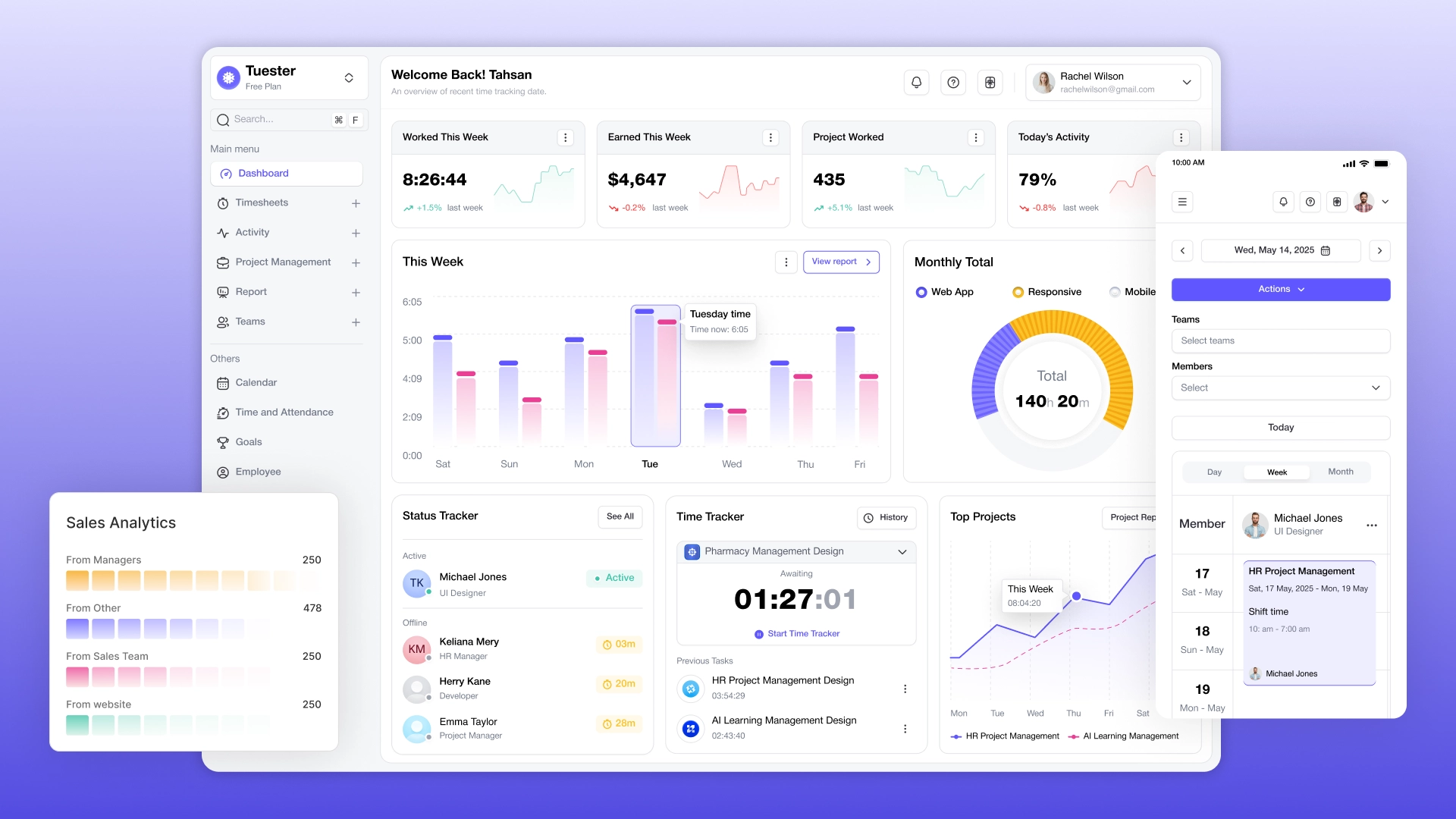
Running a business is becoming more and more difficult every year. The market situation is changing rapidly, competition is intensifying, and clients demand attention here and now. Without a reliable management system it is difficult to count on stable growth, because today it is not the biggest business that survives, but the one that adapts quickly. Therefore, the development and implementation of CRM systems is not just a trend, but a necessity and a strategic advantage. Whatever field you work in, if you want to keep your finger on the pulse and keep up with innovations, it’s time to order CRM development for business.
AVADA MEDIA is a reliable partner for those who want to take their business to the next level. Our team will develop for you a full-fledged intelligent tool that will help you build effective business processes, accelerate sales, analyze customer behavior and optimize the work of the whole team.
A modern CRM system for business is a comprehensive platform that integrates all customer interaction channels and internal business processes into a single information space. Automation with a modern customized management system will help you reduce costs, improve service and scale your project without risk and stress. This tool allows you to control every step – from the first touch of a potential client to post-sales service, analyze data and build long-term, profitable relationships.
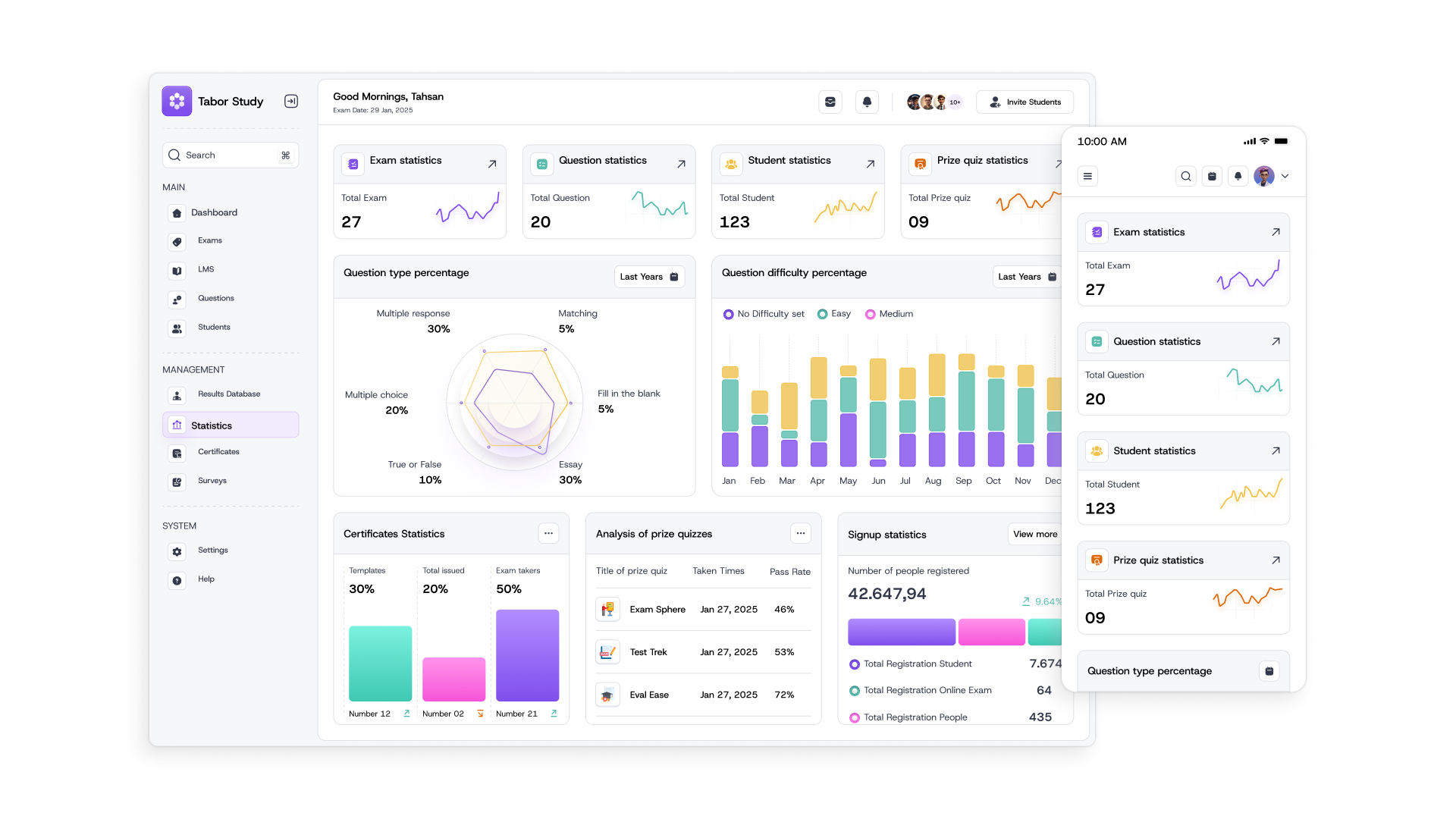
Custom development of your own CRM for business provides a solid foundation for growth, increased profitability and enhanced competitive advantage.
Automation of business processes. CRM system development permanently eliminates the human factor from operational activities. No more forgotten tasks and late notifications, data loss and missed customers. CRM captures, reminds and helps the team to work as a single cohesive organism.
Increased efficiency. Automated scripts for processing customer data and requests, sales, production and logistics save time, reduce costs and increase team productivity. Everything important is under control, everything routine and regular is automated.
Transparent analytics and control. CRM program for business will provide complete information at any time in a convenient format: online dashboards will display key metrics, departmental reports, sales funnel efficiency and other indicators. Thanks to up-to-date data, you will be able to make decisions not intuitively, but reasonably and quickly.
Optimization and standardization of processes. Implementing CRM for business helps you get rid of rash maneuvers, unnecessary risk, and disparate data. All tasks, transactions, communications and documents are formed according to a single standard. This helps eliminate errors, speeds up routine operations and increases employee accountability. Business management system with a web-based interface that provides unified regulations.
Increasing the effectiveness of marketing. Modern CRM for business is a tool for deep analysis, demand forecasting and launching personalized marketing campaigns. With CRM tools, you can segment your audience more accurately to build customized customer interaction scenarios, increasing the likelihood of conversion and shortening the transaction cycle. This improves return on advertising investment.
Improved service. CRM software personalizes your communication with customers: you can record the entire history of interactions from the first contact to repeat purchases to respond faster to requests, anticipate needs and send customized offers at the right time. Satisfied customers return and bring new ones, and your average check goes up.
Save time and resources. Automating processes significantly reduces the workload of your employees, freeing up their time for important strategic tasks. You can optimize staffing levels and reallocate resources while day-to-day activities (sending emails, setting tasks, calculations, etc.) in CRM will be performed automatically.
Flexibility and scalability. Customized business automation system allows you to easily adapt to market changes without risk and compromise: add new departments, branches, products, integrations. Growing order volumes, expanding your product range, entering new markets – all this is possible thanks to the right architecture of a unique CRM.
Data Security. When developing a customized CRM system for businesses of any format, direction, and scale, our developers provide for multiple layers of data security, including:
Partner and customer trust. For partners, investors and clients, having their own business management system with advanced automation is an important marker of a company’s maturity. It indicates transparency of processes, stability of operations and readiness to scale.
A CRM system is your control center, where every detail matters and the coordinated work of all departments becomes a reality thanks to process automation.
CRM system interface screens
A turnkey CRM implementation helps solve a number of problems critical to a company’s growth, sustainability and development.
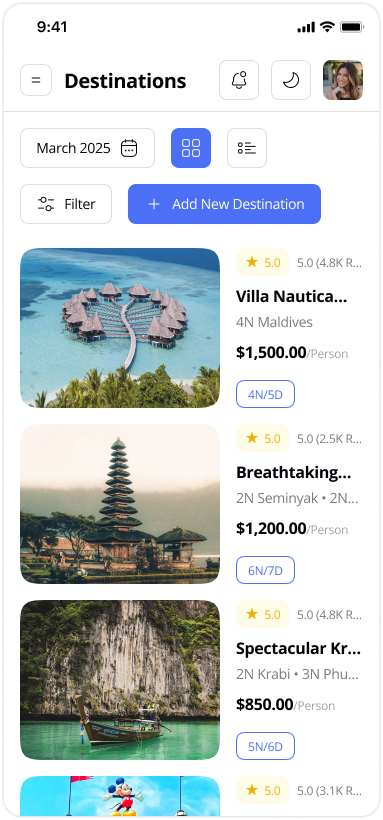
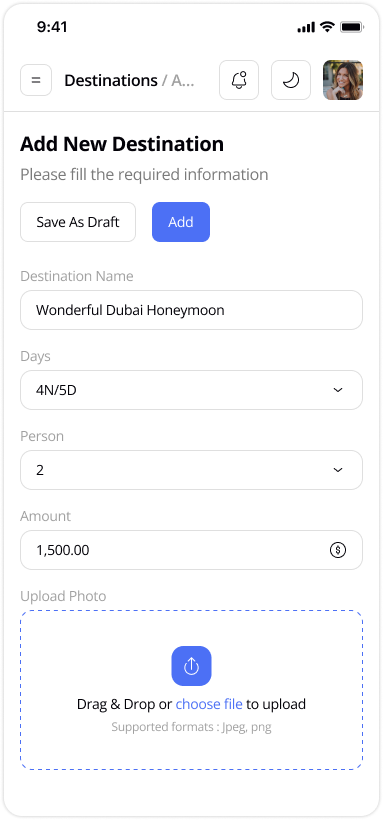
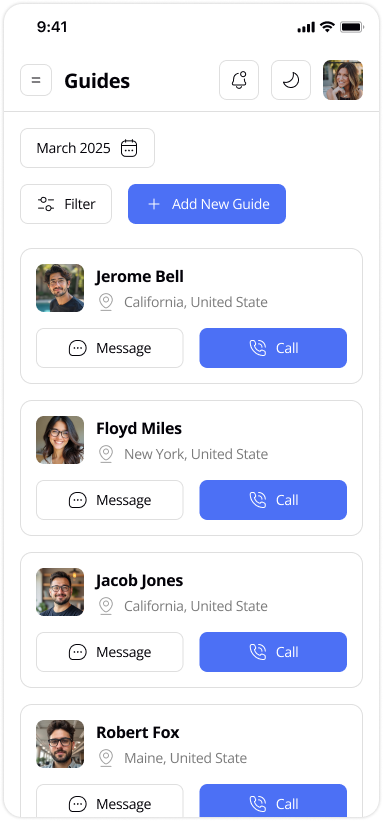
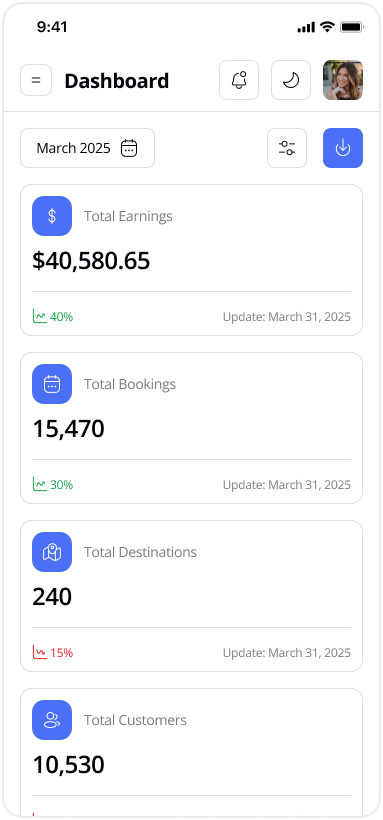
Screens of a mobile CRM system
In the past, only large corporations sought to order CRM, but today competent process management is becoming critical for businesses of any size and direction.
Regardless of business direction and specificity of processes, a customized CRM system will be a powerful driver of your company’s growth, accuracy, and efficiency. Automation will not only optimize daily tasks, but also open new horizons for development.
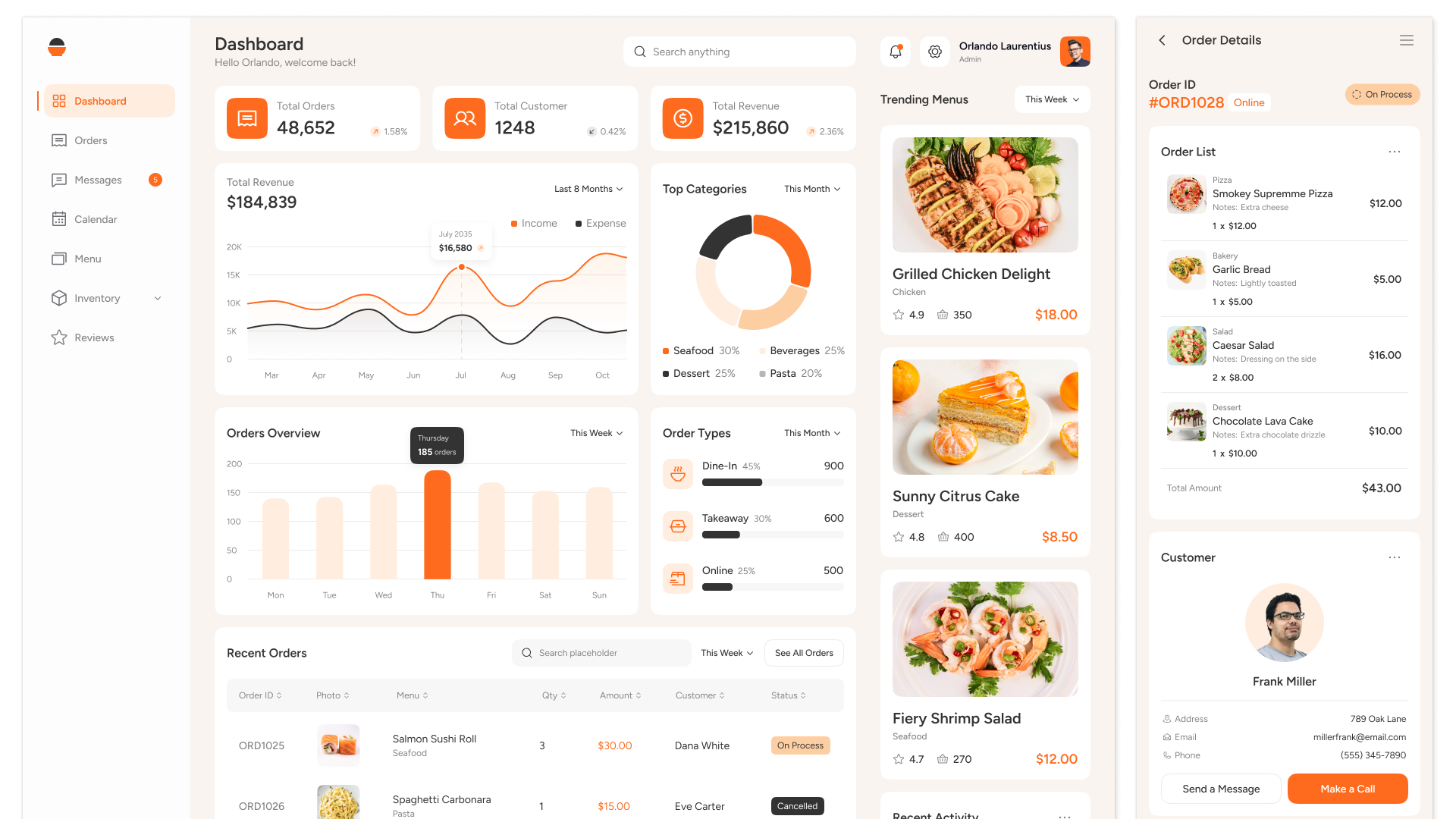
Creating a CRM system will help make your business manageable, transparent and ready to scale, but it is important to realize that an effective CRM system cannot be universal. Each niche requires its own unique set of features that takes into account the specifics of work, processes and market requirements. Moreover, no matter what region CRM-system is designed for – Ukraine or Europe, it must ensure high efficiency and compliance with local legislation.
Modern CRM is not just a customer database, but a multi-level system that combines data, processes and analytics. Its structure is built around several key modules, helping to build an effective management model, customized to the real tasks of a small startup, a large company or a multinational corporation.
Modular architecture not only allows you to run your business program faster, but also to easily supplement it with new features. If you already have a CRM system, the development of additional functionality is a priori not limited by anything. You get a tool that develops with you, not limits your potential.
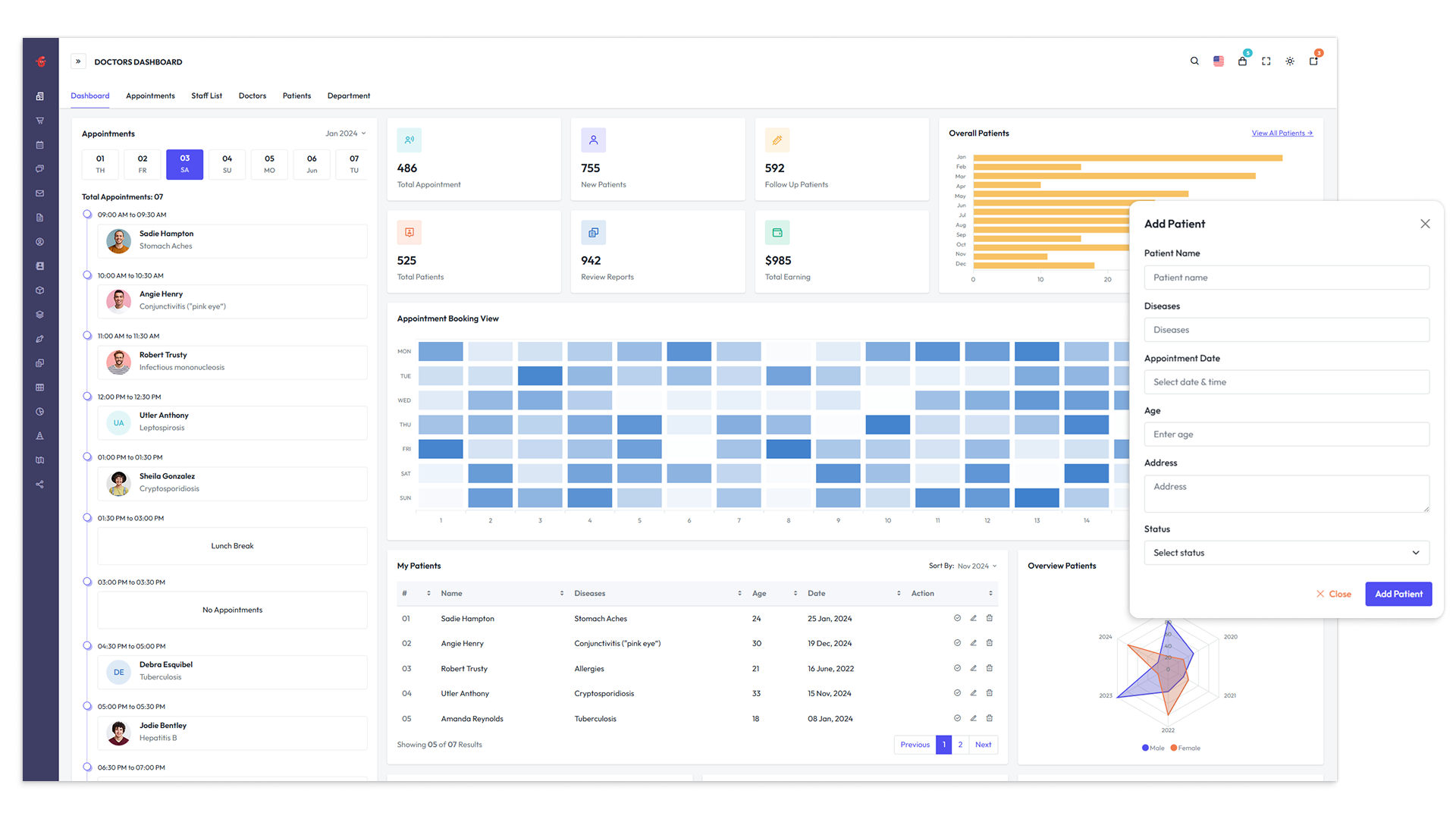
Custom CRM system development helps businesses to increase profitability mainly by increasing conversions, average check, repeat sales and more. Let’s see exactly how CRM development can help you earn more.
A clear sequence of program development allows developers and the customer to control the progress of the project and understand what result it is moving towards.
Process of creating a CRM system interface
At first glance, off-the-shelf programs may seem like a simple and affordable solution: quick startup, standard functionality, low entry threshold. However, universality hides serious limitations, especially if you plan to scale or work in a specific niche. Therefore, the best CRM systems for business are developed individually.
Limitations in logic and architecture
Typical platforms usually don’t take into account a company’s unique business processes, forcing the company to adapt to the logic of the system rather than the other way around. This leads to a search for compromises: the program turns out to be too complex, has a lot of unnecessary functions and an inconvenient interface. As a result, part of the team uses CRM formally or ignores it altogether, and processes continue to go manually, that is, past the system.
Difficulties with customization
Modification of the standard CRM-system for small and medium-sized businesses for their tasks often requires costly improvements that are difficult to agree or technically realize within the boxed solution. Often it turns out that the desired functionality is simply in principle impossible to realize without a complete revision of the platform architecture.
Dependence on the provider
If the system runs on an external server, the business becomes dependent on updates, tariffs, technical support, privacy policy and even API availability.
Limited scalability
Off-the-shelf CRM for SMBs is suitable for companies with a typical structure. But when a company goes beyond the standards, a simple CRM system for small business starts to stall development because it is unable to scale proportionally to the business.
Creating a CRM system from scratch is not an alternative, but a strategic decision. If having complete control over your data, flexibility and long-term growth is important to you, custom CRM development will be the best choice. It is a solution that grows with the business and really works for results. On our website you can see how a customized CRM system is developed – an example of our approach to work and the result.
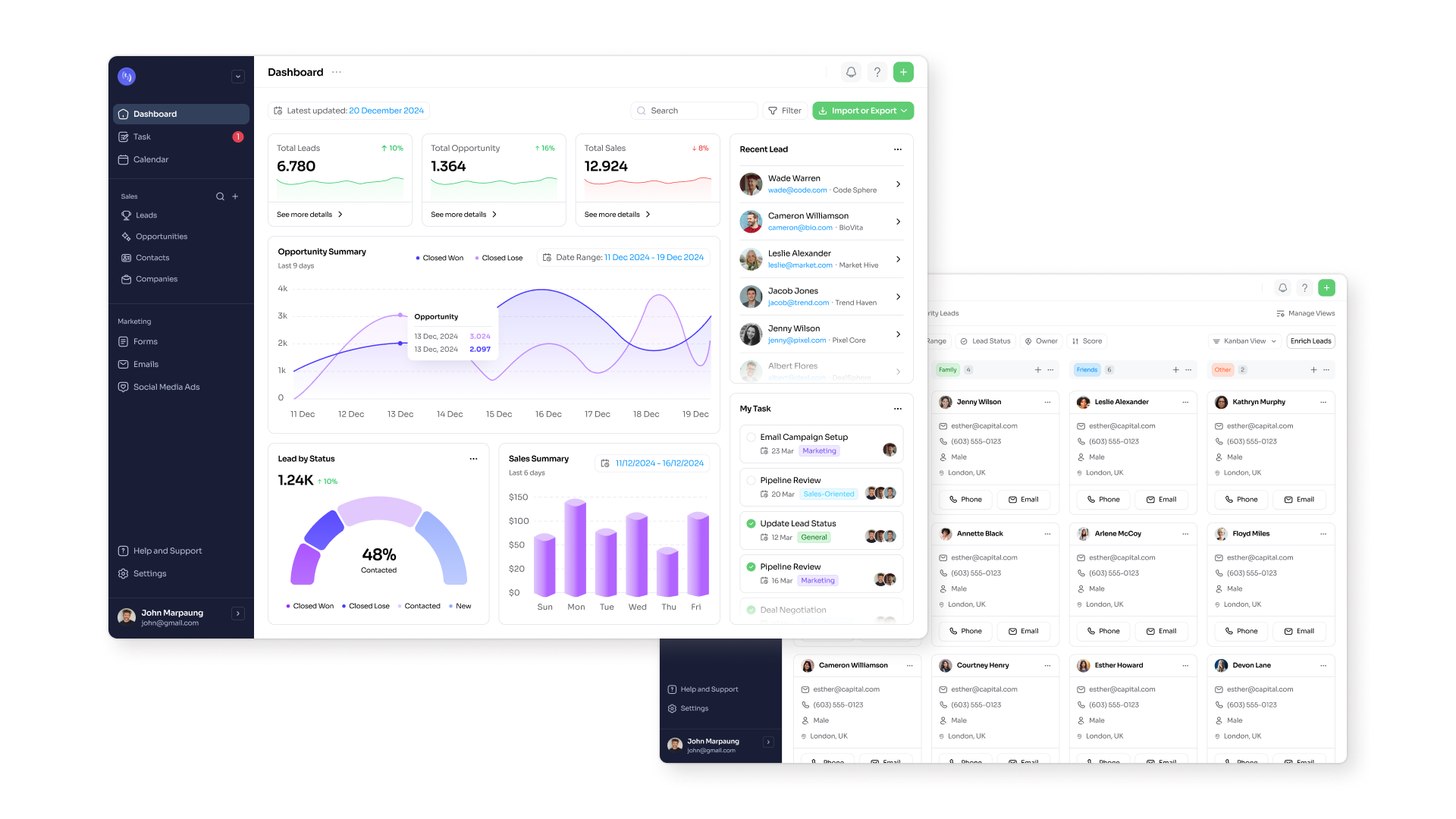
Extensive experience in creating software solutions for various business areas and detailed analysis at the initial stage of the project allows our specialists to develop custom management systems that fully meet the tasks and characteristics of the company, ensuring effective automation and sustainable growth.
Projects in the construction industry involve dozens of stages, participants, and a large amount of documentation. A centralized management system is needed to coordinate the work of contractors, keep track of purchases, and control budgets and deadlines. A CRM system for construction companies helps with this – it allows you to track each project, automate reporting, control the budget, manage contacts with suppliers and customers, and improve internal communication between departments. Analytics tools make it possible to forecast project completion dates and optimize resource planning.
In the real estate industry, it is important to quickly process requests, keep track of customer interactions, and monitor properties. These tasks are solved by a CRM system for realtors and real estate agencies–it helps structure the customer base, manage views, automate mailings, and analyze the effectiveness of managers. Such a custom tool shortens the sales cycle, simplifies database management, and ensures high quality service.
For example, the CRM system for real estate sales “Novostroy” – developed by AVADA MEDIA – is successfully used by large agencies and developers to automate the entire sales cycle. Our developers have taken into account all the specific processes of the industry: automation of reservations, customer base management, control of transaction statuses, synchronization with sales departments, integration with the developer’s website, as well as flexible scaling for new residential complexes and agencies.
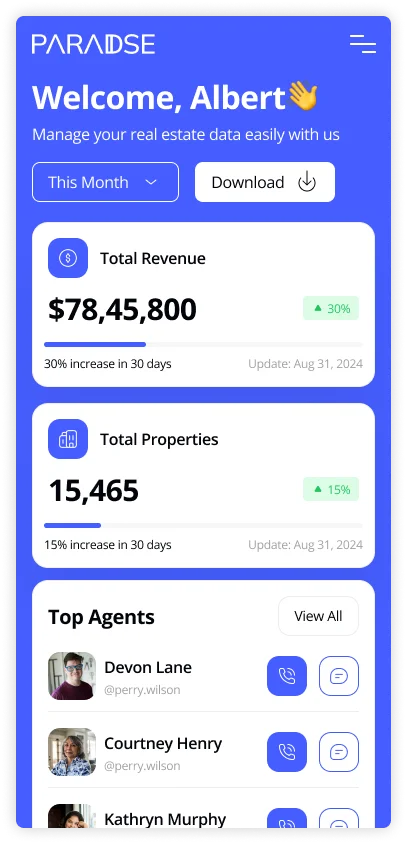
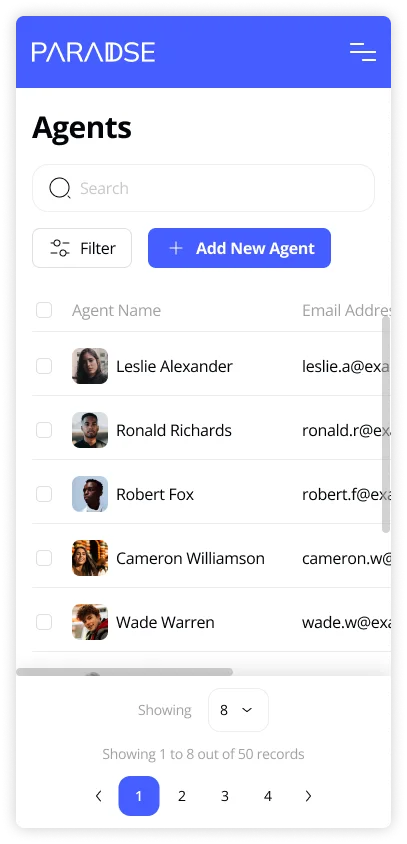
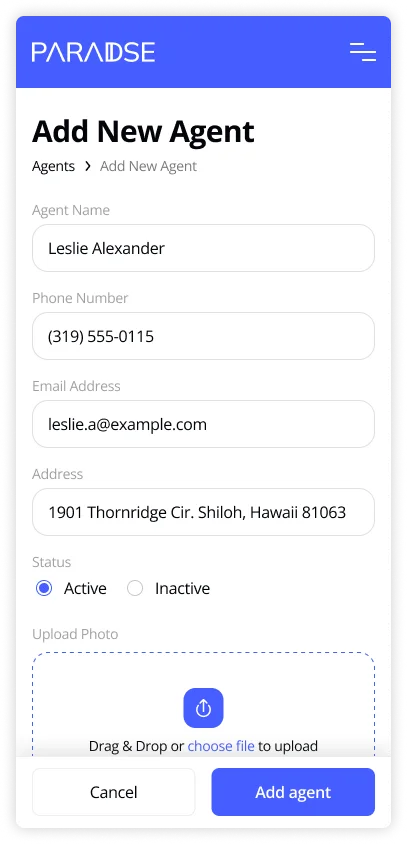
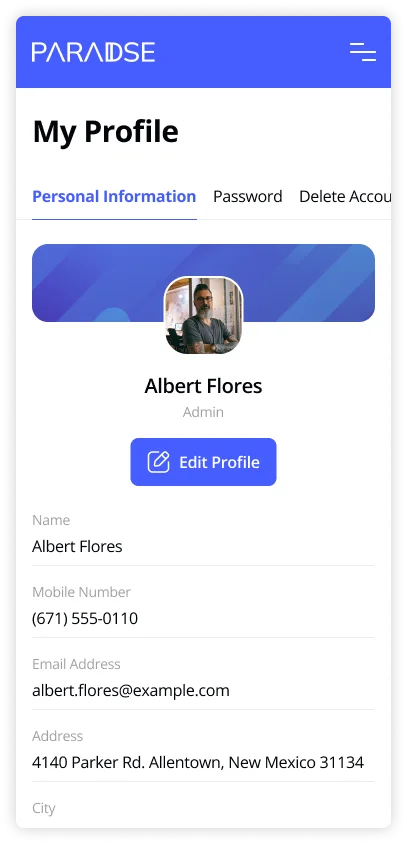
Mobile version of CRM for real estate agencies
Legal business is a large volume of documentation, dozens of cases at the same time and high confidentiality requirements. Automation provides centralized access to information, increases work efficiency and reduces the risk of errors. CRM system for legal business helps to structure document flow, manage tasks, control the deadlines of court hearings, store the history of appeals and form contract templates.
To ensure a high level of service in gyms and fitness clubs, the management of subscriptions, visits, trainers’ schedules and individual programs must be automated. This task is handled by a CRM system for fitness clubs, which allows you to record customer data, manage the class schedule, remind about training, launch automated mailings and loyalty programs. Thanks to the program, communication with customers improves, subscriber retention increases and the workload on staff is optimized.
The tourism business strives to automate booking processes, effectively manage the client base and partner relationships. Travel agencies need a tool for tracking order statuses, setting up automatic mailings and personalized offers. A CRM system for travel agencies and tour operators allows you to select tours taking into account the client’s preferences, automatically generate all necessary documents, control payment and build system communication at each stage of interaction.
The beauty industry requires precise planning and constant contact with the client. Appointment reminders, individual offers, bonus accruals – all this is part of the level of service that customers expect today. A CRM system for beauty salons allows you to centrally manage the schedule, customer records, history of their visits, preferences and automate marketing activities.
Modern call centers work with a large volume of calls and require precise coordination of processes. They need a specialized program that combines telephony, instant messengers, email and other channels in a single interface. Automation of routine tasks, built-in analytics, KPI reports and service quality assessment will help increase team productivity and ensure a high level of service. CRM for call centers solves these tasks: it records all operator actions, supports work according to scripts and allows you to monitor key indicators.
Logistics companies work with a large number of orders, documentation and routes. In this business, it is important to track cargo in real time, control deadlines, orders and coordinate transport. A CRM system for logistics helps to optimize routes, reduce operating costs, generate reporting and increase the overall efficiency of the logistics chain.
Clinics and diagnostic centers work with confidential information, schedules and medical documentation. To optimize staff work, reduce queues and improve the quality of patient care, centralized management of patient data, doctor schedules and internal processes is necessary. A CRM system for clinics and medical centers effectively solves these tasks – it can automate appointments, integrate with laboratories and cash registers, maintain electronic medical records, provide analytics, send patients messages and remind them about visits.
The hotel business requires accurate booking records, an individual approach to each guest, and coordinated work of all services. A CRM system for hotels will help to combine the management of the customer base, room stock, services, and communications. The program can record the history of visits and guest preferences, automate mailings, and manage promotions and loyalty programs. This approach allows you to improve the quality of service, increase hotel occupancy, and encourage repeat bookings.
In the banking sector, it is important to effectively manage the customer base, control operations and data security, automate application processing, and build trusting relationships with customers. CRM for banks helps solve these tasks – the program simplifies the issuance of loans, control of operations, and support of financial products, automatically assessing risks, managing sales funnels, documentation, and tasks for managers.
To successfully run a restaurant business, it is necessary to ensure effective management of reservations, orders, and communication with guests. A CRM system for restaurants and cafes helps to analyze the loading of the hall, manage staff changes, generate personalized offers, automate order taking, delivery, payments and manage loyalty programs.
This area requires clear task planning, budget control and constant analysis of campaign effectiveness. Marketers strive to ensure transparency of processes, synchronize the work of teams and record all events. A CRM system for marketing agencies effectively solves these tasks. It can store interactions, manage projects, automate communications, integrate with advertising platforms, email services and messengers and generate reports on key metrics in one click.
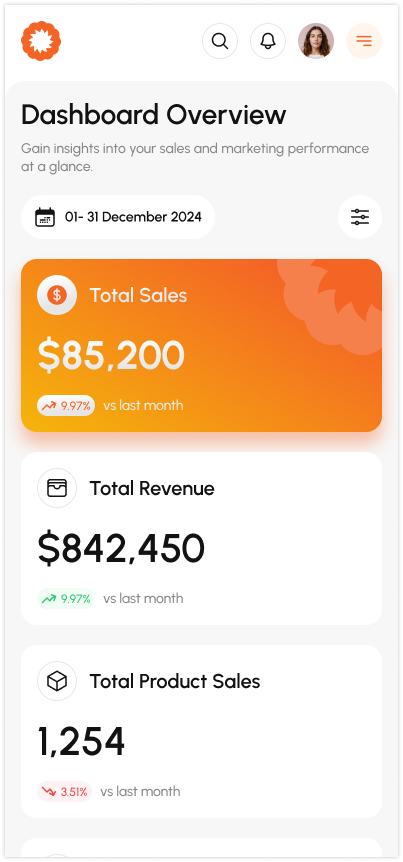
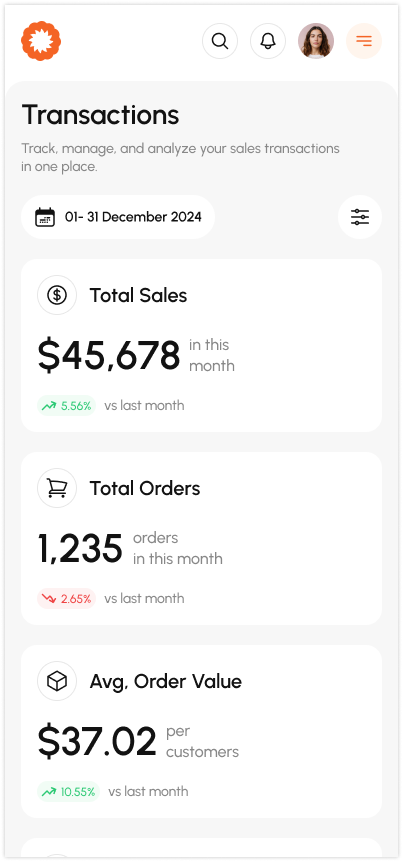
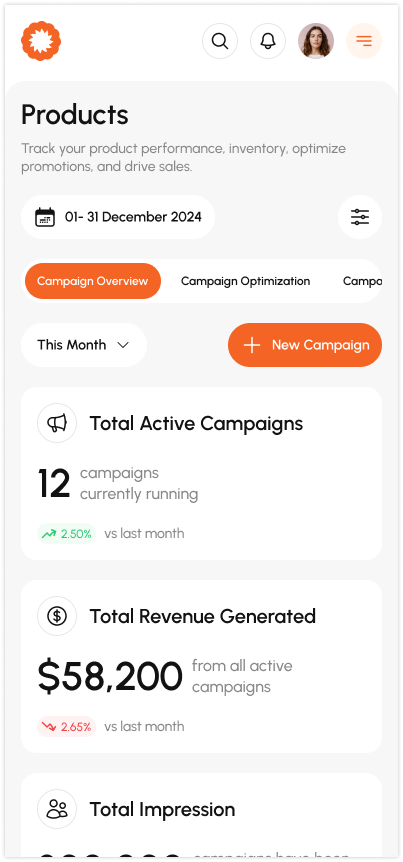
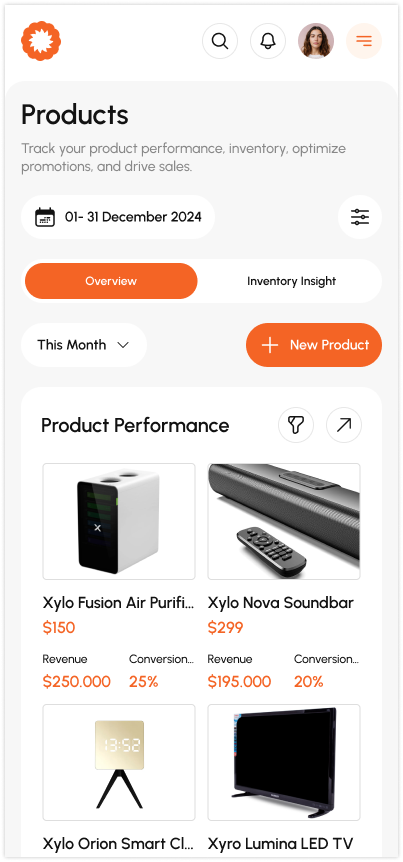
CRM for marketing and advertising
The financial department and accounting require accuracy, clear document flow and timely payment control. An individual management system takes care of accounting for clients, contracts and settlements, automates debt control and sending messages, invoicing and generating reports. The CRM system for accountants and financial accounting reduces the number of errors, improves financial planning and increases the transparency of operations.
Effective project management in the IT sphere depends on the correct distribution of tasks and synchronization of departments. Automation helps to control processes, time, communications and resources. The CRM system for IT companies can integrate with trackers, analytics and support, which allows you to scale processes, track progress and provide a high level of customer service.
Agriculture requires control over crops, yields, equipment and logistics. To combine these processes, control purchases and monitor the efficiency of agricultural teams, a CRM system for agribusiness is used. It allows you to keep track of land plots, automate document flow, track contracts and plan seasonal indicators.
In dropshipping, the speed of order processing and the accuracy of interaction with suppliers are critically important. The CRM system for dropshipping helps to automate the processes of ordering, payment, return and delivery, track the effectiveness of promotions and reduce operating costs when scaling a business. It integrates with marketplaces and advertising channels.
Any production requires strict control of all stages – from the application to shipment. To organize the effective work of supply, production lines, warehouses and sales, reduce costs and speed up the execution of orders, enterprises need a CRM system for production. An individual program will help control the stages, manage orders, track costs and capacity utilization.
Cosmetology and plastic surgery clinics strive for a high level of service and patient comfort. A CRM system for aesthetic clinics helps to manage records, procedures, visit histories and photo archives, control consumables and loyalty programs, and automate marketing. Having an individual management system strengthens the image, increases repeat visits and the average check.
Barbershops need a simple and functional solution for customer registration, loading masters and promotions. The management system helps to see the load, track analytics and retain regular customers due to high-quality service. This task is solved by a CRM system for barbershops – it can automate records, payments, bonus programs and warehouse accounting.
Companies related to passenger transportation process a large number of applications every day, manage drivers and optimize routes. To reduce the time of providing transport and improve the customer experience, a CRM system for taxis is needed. The program helps to automate the distribution of trips, keep track of payments, integrate with GPS and applications.
Companies in the field of freight transportation are faced with a large volume of orders and precise coordination. Route management, cargo tracking and document management – all this can be taken care of by a CRM system for freight transportation. It is able to take into account transportation, loading, delivery costs and allows you to build transparent communication with customers, increasing the reliability and speed of order fulfillment.
The insurance business requires careful management of the customer base and policy management, storage of applications and timely renewal. The CRM system for insurance companies automates calculations, notifications and storage of documents. The system also integrates with payment, legal modules and customer history. This increases the speed of application processing and the level of service
In eCommerce, hundreds of orders are processed every day and thousands of customers interact with each other. Managing sellers, products, orders, logistics and customer requests requires automation. A CRM system for the marketplace will help to centralize these processes, which keeps track of seller activity, processes applications, manages returns and sales analytics, and helps to build personalized communications based on behavioral data.
Controlling records, treatment history, vaccinations, accounting for food and individual characteristics of animals requires a centralized approach. A CRM system for veterinary clinics and animal shelters helps to improve the quality of services and customer trust. It combines all the work processes of veterinarians, automates recording, scheduling and reminders.
In the field of international logistics, it is important to synchronize schedules, control document flow and ensure transparent communication with customers. To speed up order processing and reduce costs, companies need a specialized CRM system for sea transportation that allows you to manage shipments, integrates with tracking, container accounting, controls documents and payments.
Financial organizations that issue microloans (online quick lending services, pawnshops, credit unions) work with thousands of applications every day, check clients, sign contracts and monitor the return of funds. For MFIs, it is important to reduce the risk of delays, increase employee productivity and improve the quality of customer service. This is helped by a CRM system for microfinance organizations, which automates key processes – processing and scoring applications, accounting for loan agreements and communication with borrowers.
Managing facilities, lease terms, payments and communication with tenants critically requires automation, which will reduce the workload on staff and strengthen control. A CRM system for rental businesses allows you to maintain a database of contracts, remind about their renewal, manage payments and notifications.
Traffic arbitrage is analytics, A/B testing, source accounting, working with advertising networks and partners. A CRM system for arbitrageurs helps to effectively manage the budget and ROI, which combines all traffic sources, automates the accounting of leads, costs and conversions, integrates with trackers and affiliate programs. A fairly wide range of functionality was implemented by our team as part of the development of CRM for LeadsJet – a startup in the FinTech vertical of traffic arbitrage.
Controlling the stages of redemption, delivery, customs clearance and sale of cars from abroad requires clear management. The CRM system for car import from the USA allows you to keep track of customers, cars, payments and documents, automates notifications about the current stages of deliveries. An individual program builds customer trust and reduces the processing time of applications.
Our team implemented a similar solution as part of a comprehensive business automation for a company that buys and delivers cars from US auctions. In addition to CRM, we also developed a website with an online calculator for calculating shipping and customs clearance, and set up effective contextual advertising. Learn more about the details of the Normandy case.
Organizing routes, accounting for orders, tracking deliveries, and communicating with customers are the main processes in the delivery industry. A CRM system for a delivery service speeds up order fulfillment and improves service by coordinating all stages, building optimal routes, tracking statuses, and managing couriers.
Effective management of records and schedules, payment control, and encouraging repeat visits are important in car washes. A CRM system for a car wash helps to ensure fast customer service and transparent accounting: it can automate records, keep track of services performed, collect analytics on workload, employee efficiency, and average check.
Car sales are a complex cycle with test drives, discussions, large sums, and related services. Car dealerships and car sales companies work with dozens of positions, customers, and partners. A CRM system for a car dealership allows you to manage the sales funnel, record customer interactions, generate commercial offers, and analyze manager performance.
Trading in auto parts requires accurate search, inventory accounting, dynamic pricing, and fast customer service. To reduce operational workload, a CRM system for a car dealership is needed that helps integrate product accounting, automate orders, control deliveries, and ensure fast processing of requests.
Business automation is not just software installation, but a comprehensive transformation of processes taking into account the specifics of the business, current tasks, organizational structure, and customer expectations. It is important to work out the scenarios and logic in detail, train the team, and ensure performance monitoring. At AVADA MEDIA, we approach the implementation of CRM systems comprehensively, so they become a real driver of growth and management.
CRM for car dealerships
Many people still think that CRM systems are a solution only for large companies with large sales and marketing departments. But in practice, small companies face the same challenges, only he has much less resources to cope with them. But even a simple CRM for small business helps to overcome them.
Finally, implementing CRM for small businesses opens access to tools that were previously available only to large companies: marketing automation, sales analytics, and funnel management. This allows you to compete on an equal footing and grow faster without increasing staff costs.
Implementing a CRM system is a huge step forward for any business, and it does come with some risks. But all the potential problems are insignificant compared to the benefits that automation brings. And if you order CRM development from an experienced team, you can successfully manage these risks and minimize them.
High cost of implementation
Developing a CRM system does require investment: both financial and time. The main reasons for the high cost are the development of custom functionality, adaptation of the existing system to the specifics of the business, integration with other services, and creation of a unique design.
In case of custom development, the costs are optimized due to precise elaboration of functionality, absence of unnecessary modules and flexible budget management. You pay only for what your business really needs, not for unnecessary functions.
Difficulties with staff training
Transition to a new system always requires adaptation of employees, due to which there may be a decrease in their productivity at the start of the program implementation. When developing CRM from scratch, we take into account the peculiarities of employee tasks and regular processes, so the interfaces and logic of work are maximally adapted to different groups of users. In addition, we provide training and follow-up support, ensuring a smooth and stress-free transition to the new CRM.
Employee resistance
Any change in the way a company operates can cause staff wariness or resistance: employees may be afraid of additional responsibilities, supervision, or more complex workflows. This risk is minimized by user-friendly interfaces designed with real user tasks in mind, as well as team involvement in the implementation process. When employees understand the value of the system and see that it simplifies their work, not complicates it, the level of resistance is significantly reduced.
Technical failures and provider dependency
Any digital system can encounter technical glitches. And we realize that every downtime due to technical glitches is business critical. That’s why we offer custom CRM development services wherein we create a unique robust architecture, scalable infrastructure and thoroughly test the product and provide technical support and updates after launch, reducing the risk of downtime due to program failures. In addition, if your program is hosted internally, it is completely independent of third parties.
Lengthy implementation process
The development and implementation of CRM for business really takes time when it comes to a unique complex solution. Our specialists build the process step-by-step, using flexible development methodologies (Agile, Scrum), which allows you to implement the system gradually, but without delay. Our specialists build the process step-by-step, using flexible development methodologies (Agile, Scrum), which allows to implement the system gradually, but without delaying the deadlines. With this approach, the customer will see the first results sooner.
Data security and confidentiality
CRM system for business stores and processes important data: customer bases, transactions, reports, financial information. The threat of data leakage is one of the most serious risks. Therefore, during custom development we use modern data protection protocols, multi-level system of access rights, information encryption and backup. We always ensure a high level of security and compliance with legal requirements.
All risks are usually associated with incorrect choice of solutions or poor quality project implementation. When you work with an experienced team that develops CRM for your business, they are manageable at every stage.
Key criteria for choosing a CRM development company for business:
The choice of a reliable contractor is a key factor in the successful realization of a CRM project. With our team CRM will be for your company a powerful tool for growth, efficiency and business control.
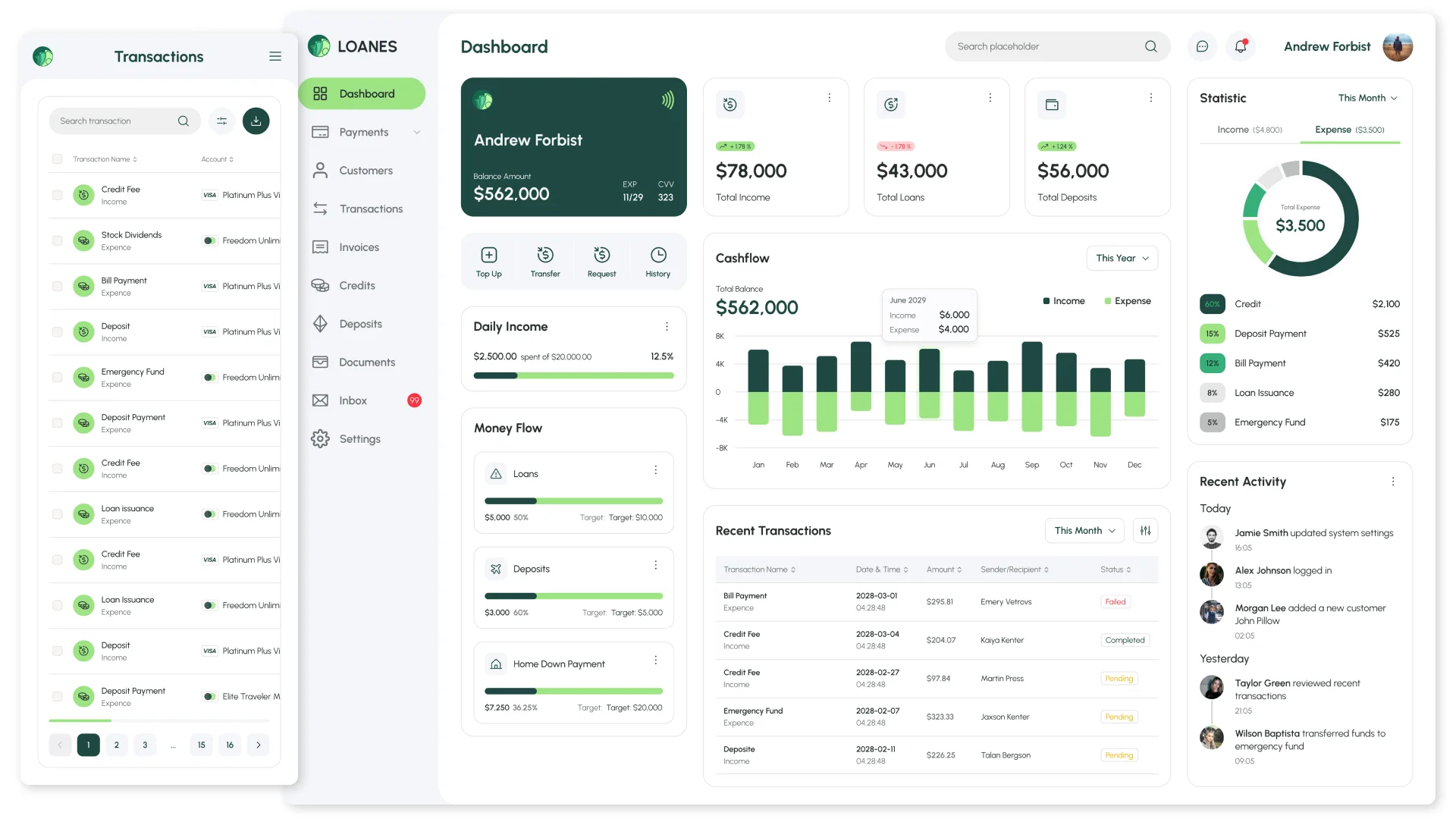
Our team has been developing CRM solutions for businesses from startups to large manufacturing companies, from trade to hospitality for more than 10 years. We know for sure: CRM costs (implementation, development, support) are an investment in a sustainable future, that’s why we create unique software products. It is profitable to order CRM development from us because we:
Does CRM replace an ERP system?
A CRM system for your business won’t replace ERP, but it can complement or close some of the functionality, such as warehouse, financial, and task management.
Is it possible to work in CRM without Internet access?
If the system is cloud-based, it will be temporarily unavailable without a network connection, but the data will be saved. Creating CRM systems on an internal server ensures complete autonomy.
How to avoid overloading the CRM interface for large businesses?
When developing a CRM system for business, the roles of employees are taken into account, meaning that each user sees only the blocks he or she needs. This makes the interface easy, does not distract from tasks, and helps to use the program as efficiently as possible.
How much time and investment does it take to create a CRM from scratch?
How long it will take to develop a CRM system, the price of the program, and further support after implementation depends on the complexity of the project. A basic turnkey CRM can be ready in 3-4 months, while more complex solutions with integrations and advanced functionality will take longer. You can order an MVP – a management system with key functions and gradually develop it.
The cost of a CRM system for a small business and a large company differs due to the different scope of work, the required stack, the specialists involved, and the development time.
Is it possible to order a mobile version of CRM?
We develop cross-platform mobile CRMs for iOS and Android so you can control sales, finances, and tasks from anywhere. Access to CRM for your business via smartphone is also convenient for field employees, couriers, insurance and sales agents.
How do I know what features my business needs?
Before developing a CRM, we conduct a detailed audit of business processes. We analyze which tasks take a lot of time, where mistakes are possible, and how processes can be automated. Based on this data, we design a CRM that solves real business problems.
How difficult is it for employees to learn how to work in CRM?
If CRM is customized for your company’s processes, training takes a minimum of time. Our developers create the interface and logic of the CRM system for business so that all users can work with the program conveniently and clearly. In addition, we train employees, provide step-by-step guides, video instructions, and chat support. This helps to quickly adapt the team to the new tool and use CRM as efficiently as possible.
Can I use CRM to work with contractors or franchisees?
CRM can be a great platform for controlling external teams and partners. In the program, you can set access levels, delegate tasks, and track work in a single system.
How to evaluate the effectiveness of CRM after implementation?
It depends on what analytics the CRM system provides, for example: sales figures, funnels, task completion, customers, etc.
Is it possible to manage the production cycle with CRM?
Custom CRM development for a manufacturing business may include the implementation of modules for planning and controlling production stages, product quality, material accounting, equipment loading, and much more.
Our works
Contact the experts Have a question?
Developed by AVADA-MEDIA™
The user, filling out an application on the website https://avada-media.ua/ (hereinafter referred to as the Site), agrees to the terms of this Consent for the processing of personal data (hereinafter referred to as the Consent) in accordance with the Law of Ukraine “On the collection of personal data”. Acceptance of the offer of the Consent is the sending of an application from the Site or an order from the Operator by telephone of the Site.
The user gives his consent to the processing of his personal data with the following conditions:
1. This Consent is given to the processing of personal data both without and using automation tools.
2. Consent applies to the following information: name, phone, email.
3. Consent to the processing of personal data is given in order to provide the User with an answer to the application, further conclude and fulfill obligations under the contracts, provide customer support, inform about services that, in the opinion of the Operator, may be of interest to the User, conduct surveys and market research.
4. The User grants the Operator the right to carry out the following actions (operations) with personal data: collection, recording, systematization, accumulation, storage, clarification (updating, changing), use, depersonalization, blocking, deletion and destruction, transfer to third parties, with the consent of the subject of personal data and compliance with measures to protect personal data from unauthorized access.
5. Personal data is processed by the Operator until all necessary procedures are completed. Also, processing can be stopped at the request of the User by e-mail: info@avada-media.com.ua
6. The User confirms that by giving Consent, he acts freely, by his will and in his interest.
7. This Consent is valid indefinitely until the termination of the processing of personal data for the reasons specified in clause 5 of this document.
Send CV
Contact us in any convenient way for you:
+ 38 (097) 036 29 32